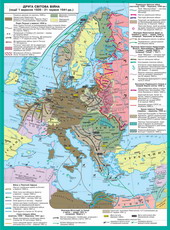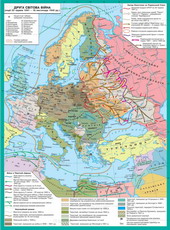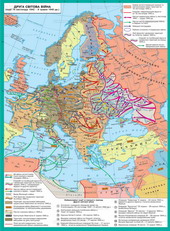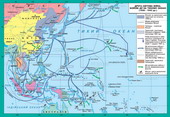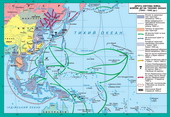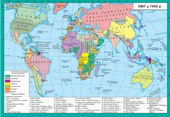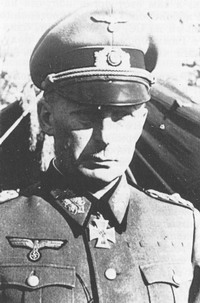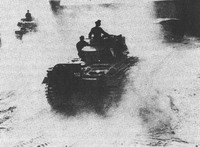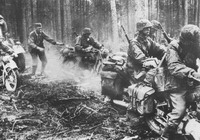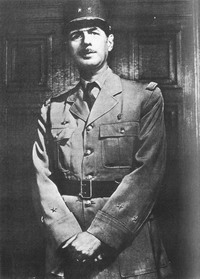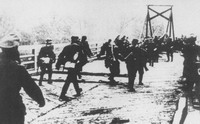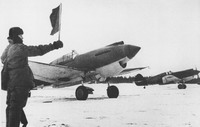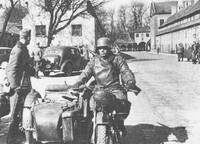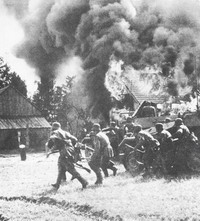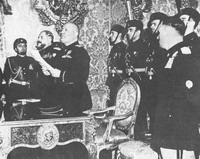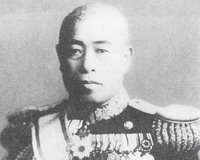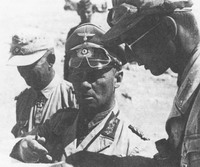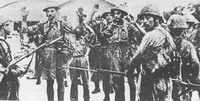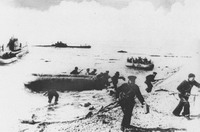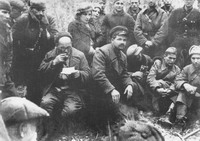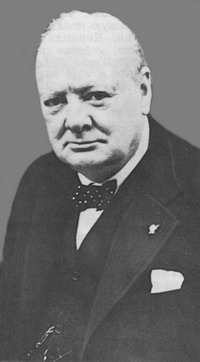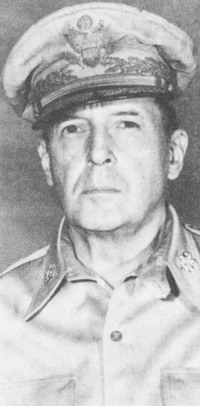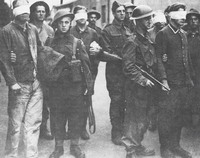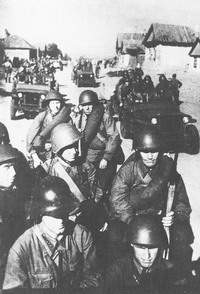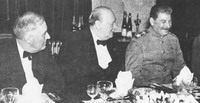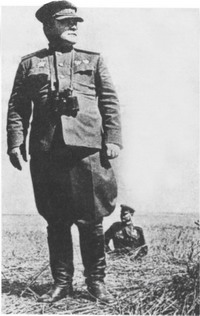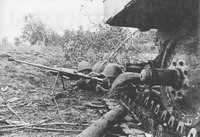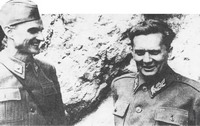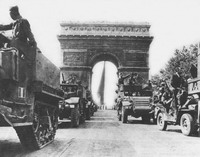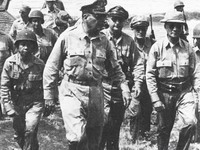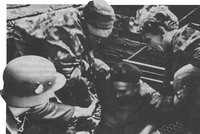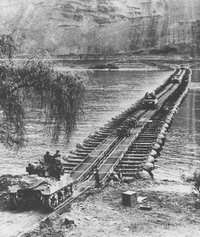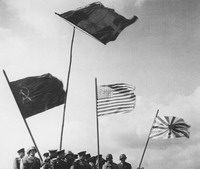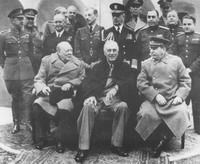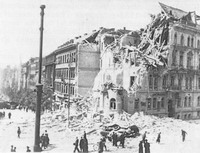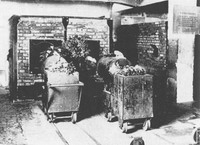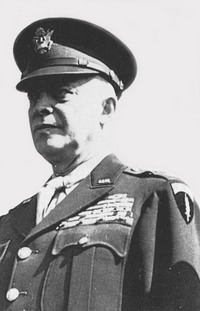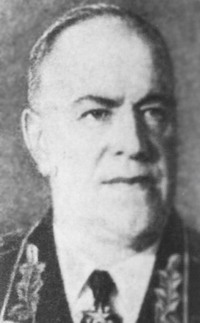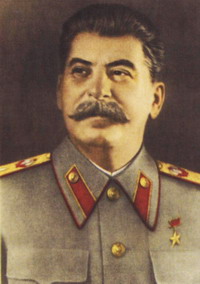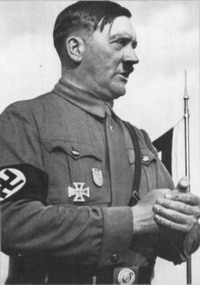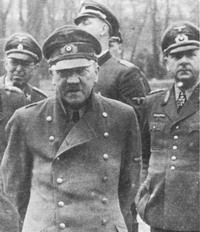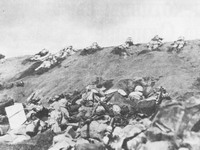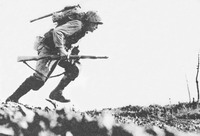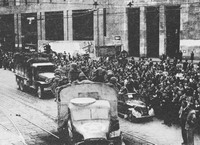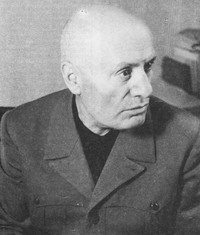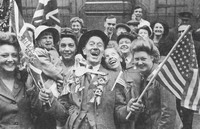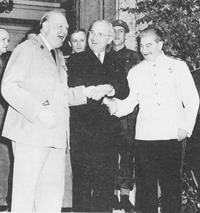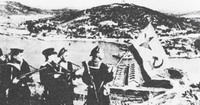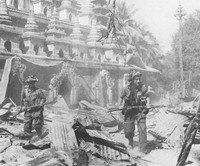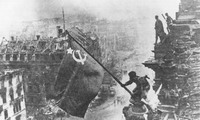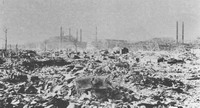§ 7.Completion and results of World War II
1. Completionhostilities in Europe. Capitulation
With the start of 1945 starteddecisive battles to defeat Nazi Germany. January 12, 1945Soviet and Polish troops launched the Vistula-odersku operation, which subsequentlygrew in Berlin. During the first days of the offensive have German defense wasprorvano and 17 January liberated Warsaw. Developing the offensive at the beginning1945 Soviet troops come in r.Oder in 60-70 km from Berlin.There have been surrounded by German group in East Prussia, which was soondestroyed.
After the Soviet offensive inPoland (Vistula-Oderska operation), the German command decided totermination Ardennes offensive in the most operationally and transferred to the Eastern part offront in the region of Lake Balaton (Hungary), where German troops unsuccessfullyattempted offensives deblokuvaty surrounded by groups in Budapest.Beating the enemy's fierce attack Soviet troops pereyshlyu counteroffensive. Breakingfierce resistance and bringing great losses of Soviet troops captured February 13Budapest, April 4 - Bratislava, 7 April - Vienna. Southern groupGerman-Hungarian army was destroyed.
February 8, 1945 troopsallies, reordering and replenished the parts that were costly ina German offensive began forcing the operation to seize the Rhine and Ruhr (industrialCenter of Germany). This operation was accompanied by strategic bombingGermany. During the bombing of Dresden killed 135 thousand civilians. Inthe successful crossing the Rhine German groups in the Ruhr wassurrounded and April 17, 1945 halting resistance. In 325 taken prisonerthousand soldiers. After the defeat of German forces did little resistanceWestern Front, besides they had no prepared positions, where you canorganize resistance. Allied troops advanced quickly to the east and 18 April toour troops went to the Elbe. April 26 in area Torgau metAmerican and Soviet troops. Meanwhile, Soviet troops complete thedestruction of the Berlin garrison, which surrendered May 2.
On May 7, Eisenhower's headquarters inReims General yodel signed a preliminary protocol of surrender of Germany.
April 9, 1945 startedoffensive Anglo-American forces in northern Italy, completing the liberation of, together with the guerrillas May 2. Millions of German troops groupingmade weapons. During the fighting partisans captured Mussolini in captivity and manyleaders of the Nazi party and state. All of them were executed. BodyMussolini and his mistress were hung Petachchi legs and put on generalreview.
Building on the success of allied troopsreleased Bavaria, western Austria and part of the Czech Republic (Pilsen and KarlovyVary).
The most dramatic pages of the SecondWorld War was the Berlin operation.
In defense of the capital of the ReichNazi command did all of slogans: "Berlin willGerman! Mobilizovuvalosya entire population, could hold a weapon.Fighter squadrons were formed with tanks "Hitler" zhytlovi quartersturned on the fortress. On the defensive works with nearly 400 thousandpeople. With combat-ready Army units created groups for the attackSoviet troops on the flanks. Hitler's refusal to surrender, his calculationsdissension among the allies to end the bloody war delayed, led tounnecessary casualties. Soviet losses amounted to 78 thousand, German - 150 thousandkilled.
Spividnoshennyaforces at the beginning of the Berlin operation
|
|
Personnel
|
Tanks
|
Guns
|
Aircraft
|
|
Soviet troops
|
2,5 million people.
|
6250
|
41600
|
7500
|
|
German troops and their allies
|
1 million people.
|
1500
|
10400
|
3300
|
On the Soviet side in Berlinoperations forces participated in three fronts: 2-Belarusian, 1Belarusian and Ukrainian 1. They were commanded respectivelyKK Rokossovsky, Zhukov and Igor S. Konev.
The battle began on April 16. O 3rdam in Berlin at the time the light of floodlights went to attack tanks andinfantry. Troops under the command of Zhukov's advancing through the so-called Zeyelovskiheight. Line of defense before the enemy heights was overcome quickly,further complications began. The battle lasted all day and not even zatyhav night.Only on the morning of April 18 were taken abroad. Zav'yazalysya battles on the outskirts of Berlin.Even after four days of fronts Zhukov and Konev zimknuly ring around the city.
Hitler decides not to vtikatysouth, and personally direct the struggle for Berlin.
April 25 a small town in Torgaubank of the Elbe was known throughout the world. On that day, met here advancedPart 1 of the First Ukrainian Front and pidrozdily U.S. military.

Meeting atr.Elbi Soviet, American and British troops.
Meanwhile in Berlin were already fighting indowntown, where the enemy did stubborn resistance. All attempts by the city deblokuvatyother groups hitlerivskyh troops were in vain. Almost every househad to take by storm. "On the third day of fighting in Berlin - recalled Zhukov -specially extended track of Silesian Station was submitted fortresscannon that fired on the city center. Weight of each shell washalf a ton. Defense in Berlin rozlitalas nines. Even in the imperialOffice understands that intersection close battle for the capital of Germany ...».April 30 was taken by storm the Reichstag. Over it a red flag hoisted.

Victory Flag over the Reichstag. April 301945 р.
I wonder
The 3-shock and Army shturmovalacentral part of Berlin, was made nine combat signs (on numberdivisions), which had vodruzytysya over the Reichstag. One of them - proportional 150 thRifle Division a flag of victory,that on April 30 vodruzyly Reichstag M. Egorov and M. Kantariya. In addition eachfighter who stormed the Reichstag had the red flag, which sought to potsepytysymbol of defeated Nazi Germany.
May 1 in the command post of the 8 thHvardiys'ka army chief of staff was delivered to the ArmyGerman General Krebs. Stating that Hitler committed suicide April 30 livessuicide (also April 28, 1945 Italian partisans, carrying a sentencePeople's Tribunal, was shot and hanged by the feet of Mussolini, his mistress andsupporters). April 30, 1945 Hitler poisoned his wife Eva Braun andhimself. Their dead bodies along with the corpse Goebbels, his wife and their sixSS daughters burned in the yard), he offered to start negotiations ontruce. This was reported to Stalin, who demanded to negotiate only aboutkapitulyatsiyu unconditional. Responses from the successors of Hitler received, andhostilities resumed. The following day headquarters from Berlin Defense ordered thecessation of hostilities. Berlin fell. During the Soviet assault on the German capitaltroops lost 300 thousands killed and wounded.
The remains of German troops in northernGermany, pressed to the Baltic Sea, also capitulated. 8May 1945 in the Berlin suburb of Karlshorst before representatives of the USSR,U.S., Britain, France, General-Field Marshal V. Keitel on behalf of German governmentsigned an act of unconditional surrender of German forces. It wasVictory.

V. Keitelsigns the act of unconditional surrender. Karlhorst (Germany), May1945
However, groups of German troopsin Czechoslovakia and Austria has not made weapons. His part in Praguefought battles with members of anti-fascist uprising, which began May 5. ThrowTroops 1 st Ukrainian Front's first tank units, allowedsave the city and its inhabitants.
I wonder
It so happened that the German Praguevyzvolyalasya troops twice. The first time it "liberated" parts ALIR (RussianLiberation Army) who escape from the Soviets and realizing thatSoviet captivity their fate depends tragically, wanted to surrenderAnglo-American troops. Their flight path was to go through Prague. But theirway was the German forces that tried to suppress the anti-fascist uprising.Then part of ALIR decided to pave the way weapons, struck by a Germantroops. Broken by the city, they were greeted as liberators prazhanamy.Nezatrymuyuchys in Prague ALIR convoy moved further west. Meanwhile, north of Sovietproryvalysya troops broke resistance to Prague. May 9 they take to the streetscity. The German group "Center" was surrounded and surrendered.

RuinedHouse in Prague after the bombing. 1945
In the victory overNazi Germany in Moscow on Red Square was held June 24parade, which went down in History as the Victory Parade. Marsh consolidated regiments frontivcompleted column of soldiers, who threw for 200 Lenin mausoleum pidnizhzhya praporivdefeated the Nazi armies. Command of the parade marshal of the Soviet UnionRokossovsky, received Deputy Supreme Commander parade marshalZhukov.

Georgy Zhukov(1896-1974) - Soviet Union Mashal
2. Crimean(Yalta) and Potsdam konfereniyi and their solutions.
04/11 February 1945 "Big three"zibralasya in Yalta in the same stock as in Tehran. The meeting wasculmination in the development of relations between Stalin, Roosevelt and Churchill.The atmosphere is like a future victory vidsovuvala into the background and differencesaspirations of each party strengthen its position in pislyavoyennomu world. 3many issues could reach real agreements. Among them - the agreementprinciples of unconditional surrender of Nazi Germany: the elimination of suchits institutions, as the Nazi Party, the repressive apparatus of Nazi regimedissolution of the armed forces control the German militaryIndustry, punishment of war criminals.
In Conference adopted the Declaration onliberated Europe, "predicted a coordinated policy in the liberatedEuropean countries, the complete elimination of their consequences in fascism, supportdemocratic institutions and help people be saved.
An important achievement of the Yaltathe conference was to establish the United Nations. For adoptionUN Charter sides agreed to convene a conference in San Francisco. Resolvedwas the question about the participation of the Soviet Union in the war with Japan. Roosevelt believedit is necessary for the speedy end of the war in the Far East. Thereforehe did not object to the proposal Stalin's record in specialdocument the return of the Soviet Union after Japan's victory over Southern Sahalinu,Kurile Islands, restoration of rights to Port Arthur as a navalbase of the USSR, the Soviet Union with interests in port in DayrenChina. It was agreed dalekoshidni and other problems.
There were hostri and discussion. Nobefore the end agreed on pislyavoyenni occupation zone of Germany, onreparation in favor of winners. The Soviet side proposed levyreparation is not money, but in kind - the simultaneous removal equipmentcompanies, ships, railway rolling stock, commodity supplies forten years. In this respect Stalin were supported by Roosevelt, who stressedneobhidnist meet the demands of the USSR. Churchill, speaking about the complexitycompensation Soviet Soyuzovi its huge losses, actually impededsolution. And still unable to agree on a reparatoryCommission.
The most difficult discussions were Polishproblems. If the question of borders Poland to the USSR was in fact resolved -border should be on the "Curzon Line" with some deviations in favor ofPoland, on the western border was told only in general terms: "Polandshould get a substantial increment in the north and west. The question with whichPolish government to deal definitively resolve failed. Eventually it wasdelayed, and the declaration on Poland, "stated that" diyuchyy now in PolandThe Provisional Government should be ... reorganized on a broader democraticdemocratic basis with the inclusion of the Worker from Poland and the Poles because of theborder. "
Yalta (Crimea) Conference (4-11 February1945) with the participation of Winston Churchill, Stalin, F. Roosevelt
|
The German Question
|
The Polish question
|
Japanese issue
|
The issue of international organizations and others.
|
|
1.Vyznacheni future occupation zone of Germany troops USSR, UK, USA and France. Berlin was released in a special area. Which also forces okupovuvavsya four states.
2.Upravlinnya Germany had to carry out Allied Control Council, which vklyachala commander of the occupying troops.
3.Nimechchyna has pay reparations mrrd 1920. Dol.
4.Dosyahnuta rozbroyennya agreement and the dissolution of the armed forces of Germany, the establishment control of the military industry, ban the Nazi party, punishment of war criminals.
|
1.Zahidnyy Borders defined by the Oder and Neisse rivers.
Western Ukraine West and Belarus remained in the USSR.
2.Radyanskyy Union agreed to recognize the Polish Provisional Government of National Unity which was to hold free elections in the country.
|
USSR yazuvavsya obligated to go to war with Japan, not later than three months after the defeat of Germany under the accession of the Southern Sakhalin Kuril Islands, the rights to lease Port Arthur and the joint operation together with China Railways in Manchuria.
|
1.Pryynyato decision to convene a UN conference to develop a charter organization. The basic principles of organization and structure.
2.Pryynyato "Declaration on the liberation of Europe", which stated that the Federal State will coordinate their efforts in dealing with political and economic challenges liberated Europe.
|
The remaining issues are connected nerozv wasconsidered at the Potsdam Conference (July 17 - August 2, 1945),held by the end of hostilities in Europe.
In the participants wereOptions: U.S. interests represented by H. Truman, who became president after the deathF. Roosevelt, Winston Churchill changed on 28 July the newly elected Prime Minister K. Ettli.But Stalin was left with "Big Three".
The focus of the German standingIssues: denazification and demilitarization of the country, the punishment of war criminalsreparations, Germany's borders with neighbors and others. The Soviet Union confirmed thatenter the war against Japan under the Yalta agreement.
The agenda includedon a peace treaty with Italy, Romania, Bulgaria, Hungary andFinland. Despite the differences between participants (U.S.tried to influence the course of the conference, reporting on successful testatomic bomb), it gave a positive impetus to the development of international relationsconditionspostwar peace.
From the expression Truman G. (1945)
(Atomic bomb) the biggest thing in the world?Our investment of 2 billion dollars. paid off. The balance of forces in the worldfundamentally changed? Nuclear weapons not only revolyutsianizuye war, and canand change the course of history. "

Harry Truman
Unfortunately, this historic chancecountries have used the winner. A year has started "coldWar, which took a whole historical epoch.
Potsdam Conference (17July - 2 August 1945), Stalin, Truman G., who became presidentU.S. after the death of F. Roosevelt, W. Churchill
(From 28 July the new Prime MinisterK. Ettli)
|
The German Question
|
The Polish question
|
Japanese issue
|
Questions peace treaties with Germany's allies
|
|
1.Uzhodzheni and endorsed the general principles of the occupation policy: denazification, demilitarization, democratization and dekartelizatsiya.
Establishment of International Tribunal to punish major war criminals.
2.Radyanskomu Union passed the former East Prussian city of Koenigsberg on.
|
|
Confirmed Conditions of entry of the USSR into war with Japan.
|
Creation permanent body - the Council of Ministers of Foreign Affairs (U.S., USSR, Britain, France, China) for the coordination issues that are common interest. CMFA in the first place was to prepare a draft peace treaties with Italy, Bulgaria, Romania, Hungary and Finland.
|
3. DefeatJapan. Atomic bombings of Hiroshima and Nagasaki cities
The defeat of Nazi Germany notmeant the termination of the Second World War. Japan has continued to resistallies.
At the end of 1944 United States actuallydestroyed the Japanese fleet, which at this theater of war was a definingcharacter. The resulting victory at sea enabled USA zvilnyty from JapanesePHILIPPINES IN UKRAINE troops and several Pacific islands. In spring 1945 also EnglishJapanese troops dislodged from Birmy. Amerykanski "litayuchi fortress" (B-17, B-29)continued to increase systematychni bombing of Japanese islands. Oneheneraliv U.S. insisted that Japan "will soon return to the StoneWives. "
However the Japanese wereDetermined to fight to the last. This showed the battle for the islandIvodzima and Okinawa. So, to capture the small island of Okinawa, whichprotect 120 thousand Japanese groups
500,000th American army in full superiority at sea and in airznadobyosya two months of fierce battles (May-June 1945). Japanese onlythen cease their resistance, killed when the last defender. In the battle for the Japanese islandlost his balance and combat capable aircraft - 4 thousand planes, plus the latestlarge ship fleet.
American casualties amounted to 50 thousandkilled and wounded, 763 aircraft and 36 ships.
I wonder
During this battle the Japanesecommand decided to throw in the last battle remains the Japanese fleet led byBattleship "Yamato" - the largest battleship in the world with 460-mm guns. Meeting inopen battle with this ship did not bore well for the U.S. Navy.The Japanese fleet has been appointed the maximum amount of ammunition and fuelonly one way. Americans learned about the time out to sea this monsterand decided to destroy it by air. April 7, 1945 occurreda bloody battle. 700 Japanese aircraft (of which 355 were "kamikaze")attacked the American fleet. In turn, American aircraft attacked the "Yamato"that after 4 hours of continuous bombing sank, taking with them life2488 Japanese sailors. There have been flooded Japanese cruiser and four destroyers.Japanese Navy ceased to exist. American losses were only 15aircraft.
Realizing that the battle for Japan would beno less violent and bloody, the U.S. leadership on navazhylosuse against Japan's new weapon - the atomic bomb. Although the extentdecision about the atomic bombing of little political significance: to show theworld, including the USSR, the U.S. power.

Nuclear explosion
August 6, 1945, two days beforeanticipated entry of the USSR into the war with Japan, with heavy AmericanB-29 bombers on the Japanese city of Hiroshima atomic bomb was dropped. 9August this "experiment" repeated on Nagasaki. Totalvictims reached 200 thousand people. The number of victims has reached 500 thousand people.Justify the use of atomic weapons against civilians is impossible.

Nagasaki afterAmerican atomic bomb explosion
Another April 5, 1945 from nameSoviet government of the Japanese ambassador in Moscow was a statement that the USSRdenounces neutrality pact with Japan. Denunciation of the reasons stated that"Zminylasya situation radically ... Japan, Germany's ally, helped the latterin its war against the USSR. In addition, Japan fights with the U.S. and Britain, who are alliesSoviet Union. In Japan YOURSELF This statement caused a change of government. August 81945 USSR declared war on Japan.
Spividnoshennya forces of the USSR and Japan in the Far East beforeSoviet offensive (August 1945)
|
|
Soviet troops
|
Japanese troops (the Kwantung Army)
|
|
Personnel
|
1.570 million.
|
1,1 million people.
|
|
Guns and mortars
|
27086
|
6640
|
|
Tanks and ACS
|
5250
|
1215
|
|
Aircraft
|
3721
|
About 2000
|
Their plans for appropriate radyanskitroops launched a major attack on the Kwantung Army, which in dyslokuvalasyaManchuria and counted 1.1 million people. The general manager of troopsundertook AM Vasilevsky. Bo attended the Mongolian armyPeople's Revolutionary Army. Soviet troops had to cope with mountains, rivers,taiga, swamps, Semidesertic steppes. Willfully resisted fanatically mindedJapanese parts, especially the suicide units. Nevertheless, the Kwantungarmy in a short time was smashed. August 14 the Japanese government takesdecision to surrender.
FromEmperor Hirohito broadcast to the Japanese people, August 14, 1945
? Actually we declared warAmerica and Britain with a sincere desire
Japan to provide self-preservation and stabilization of East Asia, noway going to make territorial gains, no limitsovereignty of other nations.
But now the war lasts almost fouryears. Despite the best efforts of everyone - our valiant fightArmy, Navy, nevtomyme userdya our public servants and faithful service100-millionths of our people - military situation has not changed in favor of Japan.While all the global trends turned against our interests.
Moreover, the enemy beganapply new and most cruel bomb, whose great opportunity to destroynumber of innocent lives indeed immense. If we continue to fight, it is notonly lead to ultimate death of the Japanese nation, but also lead tototal extinction of human civilization ... "
Under the blows of the Soviet ArmyJapanese troops are weapons. In the prisoner was taken about 640 thousand people.September 1st Soviet troops planted in the southern Kurile Islands ridge.The whole campaign of Soviet troops against Japan lasted 24 days. Japanese Lossesconstituted 84 thousand troops, Soviet -12 thousand killed.
September 2, 1945 in Tokiyskiybuhti on board the American cruiser "Missouri", in the presence ofcountries that participated in the war with Japan was signed Actunconditional surrender of Japan.

Signature ActJapan to surrender. 1945
The end of the war against Japaninvolved a peace treaty with it. However, the U.S., violating its previousagreement, refused to transfer the preparation of a peace treaty with Japan Councilforeign ministers postponed the issue of peacefulsettlement in the Pacific basin.
Japan and the territory it capturedwere divided into zones of occupation between the U.S., USSR, Britain, China. Actually Japanhit the American occupation zone and September 6, 1945 U.S.troops landed in its territory.
4. ResultsWorld War II.
World War II had aryvnyh the extent of hostilities, the use of military equipment, the numberparticipants and victims, political, economic and technological implications.
Table.: The human costs of key SecondWorld War
|
Country
|
Losses
|
|
USSR
|
27 million people.
|
|
U.S.
|
297 thousand people.
|
|
England
|
335 thousand (Australia -23 (34) * ths, Canada - 37 (43) thousand in India - 24 (48) thousand new Zealand - 10 (12) thousand Passing - 6 (9) thousand people.)
|
|
France
|
373 (418) thousand people.
|
|
Belgium
|
100 thousand people.
|
|
Netherlands
|
256 thousand people.
|
|
Norway
|
13 thousand people.
|
|
Poland
|
By various An estimated 4.5 to 6.6 million people.
|
|
Yugoslavia
|
1,7 million people. (3 / 4 of the victims of ethnic massacres, civil war)
|
|
Czechoslovakia
|
317 thousand people.
|
|
Greece
|
170 (408) thousand people.
|
|
China
|
20 million people.
|
|
Germany
|
13 million people.
|
|
Italy
|
373 (556) thousand people.
|
|
Japan
|
2.23 (3.553) million.
|
|
Hungary
|
427 thousand people.
|
|
Romania
|
558 thousand people.
|
|
Bulgaria
|
More than 20 thousand people.
|
|
Finland
|
90 thousand people.
|
* In parentheses - with other data.
Of all the continents mostYevrorpa injured. Its fields were plowed ditches, trenches, nashpyhovanimines, shells, shrapnel. Many towns and villages were completely destroyed. Millionspeople remained without blood, were in exile. Industrial production inEurope declined by 40%. Heavily affected all modes of transport. Financialsituation most belligerent countries was scary. Everywhere Unstableinflation. Frank pohudshav 80%, pound - 38%. England even had to sell19% of its foreign ownership. To stabilize financial situation. Significantdamages suffered and agriculture: productivity fell, unsownremained large areas. Great quality has been made and the number of workingforce.
World War II was difficultpolitical and social phenomenon. For six years, its nature and purposeparticipants varied. War Experience has shown that it plays a big rolepolitical ambitions of leaders. Ambitions of state leaders in particular have increased byfinal stage of the war, when troops under the orders of their commander in chief,despite any loss of life, sought to capture as muchareas to achieve postwar geopolitical advantages.
But the main result of the war wasthe defeat of Nazi Germany, Fascist Italy and militaristic Japan.Scorching suffered defeat fascism (Nazism) - one of the most reactionary andmisanthropic models of totalitarianism. Fascist regimes have been eliminatedFascist parties is prohibited, fascist leaders rightly punished.Discredited itself fascist (Nazi) ideology.
The victory over fascism wasvictory of democracy and humanism. Thanks to democracy has strengthened its position inworld. It has become a defining force of social development.
But victory is not eliminated allcontradictions in the world. For the peoples of Eastern Europe and parts of Asia victoryover fascism and militarism was not a triumph of freedom and democracy,spreading totalitarianism but turned the Soviet pattern. TotalitarianismSoviet-era (Communism) by a temporary alliance with the democraticcountries and the joint victory over fascism strengthened its position in the worldexpanded its area of domination and castcall the same democracy and freedom.
The strategic goal - to end thetotalitarianism, which hatched the most courageous and farsighted policies of the West,not been met. The victory also was polovynchatoyu not for everyone. Inthis situation was formed confrontation between East and West, communismand democracy. Embodiment of this struggle was the struggle between two superpowers - the United Statesand the USSR, which resulted in the "cold war": rampant arms race, overtmistrust and hostility opposing camps.
The war endedbeginning of the collapse of the colonial system. The struggle of peoples against colonial aggressionmerged with the national liberation movement against the metropolitan, national growthidentity in Asia and Africa, which ultimately led to the fallColonial empires and the democratization of several European countries.
World War II changed notonly the map, but the fate of entire nations, particularly deportees andthose who were subjected to mass genocide (Jews, Gypsies, Serbs, etc.). Asplit of some countries and peoples of the two state (Vietnam, Korea,Germany, China), which for years has delayed the process of their association.
The Second World War gave a strongboost science and technology. His biggest discovery during the war shouldinclude making joint efforts of scientists of several countries of the atomic bomb,that eventually affected the whole development of science and technology. Radar,that have been invented in England to identify the German air armada, gavepowerful impetus for further development radiolektroniky. In general, bothdirections in physics helped forced the development of cybernetics.
Germans succeeded, though at the endwar, to begin mass production of jet engines. Tomajor discoveries during the war and German missiles are FA-1 andFAU-2, which further research efforts the U.S. and the Soviet Union transformed intoboosters of nuclear weapons and spaceships.
The huge paradox lies in the sciencethat research efforts were subject invention effective meansmass destruction of people, not of their protection.
Results
Final battles of WorldWar in Europe and the Pacific were among the least bloody in previous years.The war would take until the last day of life. However, winners and losers inwar were already known. Last month the war represented the culmination of collaborationInternational anti-Hitler coalition. It seemed that after such a terrible war withtens of millions of victims, massive destruction, lasting peace will come and rulecooperation between states. However, in this period became manifest undistinguishedSymptoms of future confrontation between two superpowers, U.S. and USSR. Action Zonedictated not military necessity and political calculations in the future.Completion of the Second World War was beginning and at the same time a new nuclear era.
Inquiries and questions:
1. Name the key events of the last stage of the war?
2. According to English historian L. Hart, military policy in England1939-1945 biennium determined by the principle: "During the war must be constantlyremember about the goals you wish to achieve after the war. " Expand Contentthis statement and confirm it with facts from the history of World War II.
3. Find out the main decisions of the Crimean and the Potsdam Peace Conference. Assolution was originated German question? As the solution of the Polish question solved?
4. What is the role of the Berlin operation in World War II? Why BerlinOperations carried Soviet troops, not war allies?
5. What caused the Soviet entry into war against Japan?
6. What purpose is pursued by the U.S., using atomic bombs against Japan?
7. Consider the reasons for the defeat of Germany and its allies and the victory ofAnti-Hitler coalition.
8. Who is the main merit of victory in World War II?
9. What are the main results of the Second World War?
 English
English










